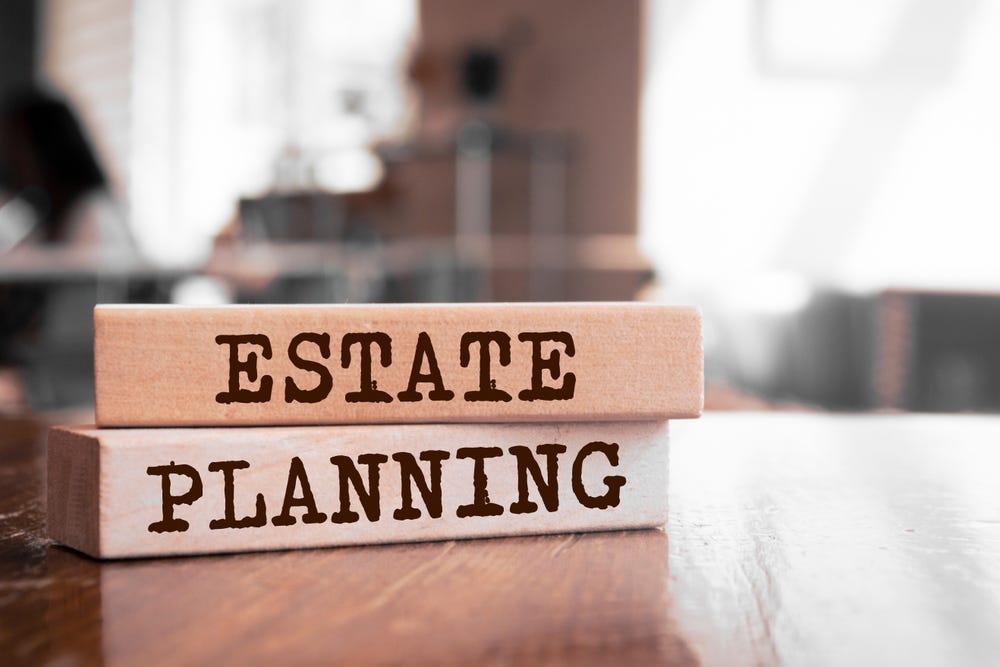Estate Planning 101
An important part of your personal finance checklist
Today’s post is about the best investment you can make for your legacy and it has nothing to do with where your money is deployed, but instead what happens to it if something happens to you.
While I write a lot about investing and returns, I also worry about the basic hygiene of personal finance - that’s to get your essentials in order. These constitute having your emergency cash fund set up and filled up, taking out insurance policies for life, health and critical illness, ensuring that your pensions and ISAs are optimised etc. However, one often overlooked aspect of this checklist is Estate Planning, something that even I have been procrastinating for way too long.
Good estate planning means having at least 2 things sorted - your Will, and your Lasting Powers of Attorney. Even the most diligent investor under-indexes on getting these basic documents in place. This is sometimes because of not wanting to think about their own morbidity or incapacity, or sometimes because of sheer laziness. The process is considered (a) confusing, (b) costly or (c) complicated.
Having recently completed the process (finally!) I am here to tell you that the process is neither of the 3. Given how unpredictable our lives are, it is best to get these documents in order, just so that the family we leave behind have stability and order in their finances, while they are dealing with the emotional turmoil of loss. That’s the least we can do for our partners, children and the family around them.
What’s a Will?
Its nothing complicated - a Will sets out what should happen to your assets should you pass away. Most governments will have a default succession plan, but depending on where you live this de-facto arrangement might be non-intuitive.
For instance, in the UK, the first £325K1 of your wealth and 50% of the remainder passes to your partner and the rest distributed among children. If you have assets of a £1M & 2 children, that means it is £662.5K to your spouse, and £168.75K to each of your children. That may not be a bad idea, but that’s not what I desire to be the actual state of affairs. I want my wife to inherit everything - because my financial plan caters to me and my wife (for the most part), not catering to my future generations.
You might think that £325K is such a large limit and given your assets aren’t there yet, this doesn’t matter. Perhaps, but remember that when it comes to wealth building, time is your greatest asset. If I had a mere £250K today, then it is likely to be closer to £500K in just under 8 years, and in about 15 years, it may be touching £1.0M, based on the latest performance report of my coffee can portfolio. My philosophy is to hope for the best, but prepare for the worst and will writing seems to encompass both aspects of the philosophy quite aptly.
“Securing your legacy isn't just for the wealthy—writing a will is your ultimate power move to protect what matters most.” - ChatGPT
Getting a Will in place, even if it just says - give it all to my wife if she is alive, and then to my children if she is not, made total sense, at least for my case.
What’s a Trust?
A Trust is a well defined structure in the UK law to allow for money to be distributed to multiple successors, often across generations, allowing for some distribution to the people who manage it (called trustees), such that it allows for flexibility and might benefit your successors immensely. For instance:
Having a Trust in place protects your wealth from new people coming into the lives of your successors. If my wife remarries, or my daughter marries, their partners do not have any claim on money in a trust, but without one, they could claim it in case of estrangement or divorce.
While a Trust arrangement can’t protect you from your estate having to pay inheritance tax, it might possibly protect the trust from having to pay any further inheritance tax in the future, even if it serves multiple generations2.
A Trust can be instructed to use the best way possible to serve the needs of your successors - sometimes that might involve giving them money outright and at other times the trust might be able to loan them money instead. You can’t have such flexibility if you pass everything on to your successors in one go.
How do wills and trusts interact?
A Will can be written in such a way that it passes everything on to a Trust upon your death and then the Trust takes over from there on. Any competent professional can set this up relatively simply.
What’s a Lasting Power of Attorney (LPA)?
LPAs are extremely structured documents that provides someone authority to act on your behalf, while you are alive, but unable to take decisions due to health reasons. This allows your partner (or whoever else you deign as your attorney) to act on your behalf when you are incapacitated in one form or other.
“Take charge of tomorrow by appointing a lasting power of attorney—because peace of mind is priceless.” - ChatGPT
There are 2 kinds of LPA - one that impacts your property and financial affairs and another that covers your health and welfare. These are standard documents and are filed with the Office of Public Guardian; they charge you a fee for that, regardless of who you get to prepare one for you.
Get a professional to do this
Every time I tried googling the process of getting these documents in place, it felt overwhelming. A few months back I attended a session organised by the lovely team at Namaste Kingston, who had invited Purely Wills, a company in this space, to put together a presentation. Duncan and Amanda from Purely Wills outlined all of the above context and patiently answered all of my (and my co-audience’s) questions. By the end of the session, I not only knew a lot more than I did before, I had the conviction to get this done.
After checking that they had a competitive pricing for the level of service they offered, and that they are in Surrey, within 30 minutes drive from my home, I engaged with them. They have been thoroughly professional adapting my document to my needs and putting together a set of documents that I am happy with.
Last week, the documents were signed by both me and my wife and have been sent off to Purely Wills’ safe storage.
What did I get done?
I got the full package, which is 2 sets of wills (called mirror wills, because yours and your partner’s mirror each other), 2 sets of trusts, and 2 sets of LPAs, giving each other the power of attorney. This cost a bit of money, but the end result is something I am happy with. I have reviewed documents produced by cheaper, online companies (I witnessed one recently) and compared to that, ours looks a few notches better and for that, the money is worth it. Some things are worth not skimping on.
An offer for my readers
I spoke to Purely Wills, and they are happy to extend a 15% discount3 to any reader who quotes “Coffee Can Investor” to them. I will not get kickbacks for referring you to them - I am doing this purely to reduce your hurdle of getting this sorted.
I worked with Amanda Watson for my wills, and she was a breeze to work with. Amanda comes highly recommended from my side. I hope you have as good as experience with her as I did.
Summary
Investing and returns are all great. But if something happens to you, your family needs your finances to be in order. They will likely be dealing with a lot of things, don’t let finances be one of those. You work hard, you save hard, you invest hard - make sure that your family benefits from it.
While you are free to take any path to getting your estate documents in place, I recommend using a professional. If you are in South West London, I suggest giving Purely Wills a call.
Happy Investing and Sound Estate Planning!
Disclaimer: I am not your financial advisor and bear no fiduciary responsibility. This post is only for educational and entertainment purposes. Do your own due diligence before acting on your personal finances, or engage a certified professional.
In general, I detest such magic numbers in these calculations. It is not indexed to inflation. So, £325K is likely to be too little over time, but no doubt will likely be revised from time to time. The problem I have is that I don’t want my estate planning to be constantly at the mercy of numbers such as these, which may not be entirely relevant to my own estate and the future finances of my family.
Up to a statutory limit of 125 years from the formation of the trust
I didn’t discuss an explicit end-date, but let’s just say it runs through to the end of 2024. Any later and I will leave you to negotiate with them directly.







Thanks for the share . A great starting point for someone who has been thinking about it. Clarifies summarily but in a lucid way. Gives starting point which is important. I agree best to go forward with professionals rather than the discount tribe pushing price. Our legacy is not a discounted life, our wills the last but important part of what we leave behind, should not be too.
Great write up !!